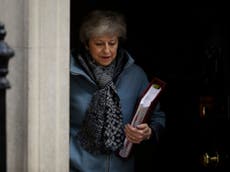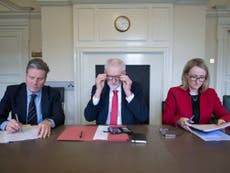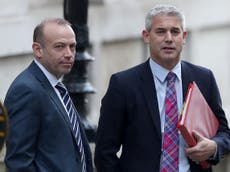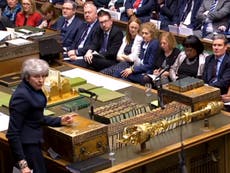The House of Commons is so divided on Brexit it has had its first tied vote for decades
Speaker Bercow’s casting vote prevented the Commons from holding a further day of indicative votes on Monday

There hasn’t been a genuine tied vote in the House of Commons for 39 years.* The last time was in January 1980, when MPs voted on the question of whether to allow TV cameras into the chamber. That vote was tied with 201 votes for and against, and the deputy speaker, Bernard Weatherill, used his casting vote against the proposal.
Weatherill used the same precedent invoked by John Bercow today, that the speaker’s casting vote should not make a decision. The result of Weatherill’s vote was to delay the televising of Commons proceedings until 1989.
The result of Speaker Bercow’s decision is to prevent the Commons from holding a further day of indicative votes on Monday. Today’s tie was on an amendment tabled by Hilary Benn, the Labour chair of the Brexit select committee, to take control of the parliamentary timetable on Monday.
That means that the current run of parliamentary days taken over by Oliver Letwin, Yvette Cooper and Benn, our temporary alternative government, has come to an end. So far, they had used a “business of the house” motion at the start of each day of indicative votes to take control of the timetable on a later day.
This time, Letwin failed to include a claim on Monday in his business motion – I don’t know if there was a disagreement within the “temporary government” about it. So Benn put down an amendment to do that, which MPs voted on separately. That vote was tied, at 310 each.
There was a delay in announcing the result and the speaker was besieged by MPs and officials offering him advice on how to proceed. After announcing his decision, Bercow was then engaged in a learned history discussion with Mike Gapes, the Independent Group MP (who will soon be called a Change UK MP), who took part in the last apparently tied vote.
That was in 1993, on a Labour amendment to a motion approving the Maastricht Treaty – the last time the question of Europe so narrowly divided the House of Commons. As Gapes said, the speaker of the day, Betty Boothroyd, cast her vote with the government, but the next day an error was discovered and the government had actually won the vote by one. By chance, then, her casting vote had not disturbed the course of history and there was no need to find out what happens if a mistake affects the outcome of a vote.
After this digression into history, the Commons voted again today, this time on Letwin’s business motion, without the Benn amendment attached. So this was a vote simply on whether to go ahead with the “alternative government” bill. This was an exercise in strenuous whipping, and the government lost by one vote.
Which means the Commons is now debating the Letwin-Cooper bill, which is a huge constitutional innovation. This is the first time in modern history a group of backbenchers have taken to themselves the power to bring in their own legislation. One of the solid constitutional principles of the 20th and early 21st centuries is that the government controls the parliamentary timetable and therefore the right to initiate laws.
Yet the bill itself is rather a vague and timid thing. It requires the prime minister to seek a further delay to Brexit if no deal is agreed. It doesn’t specify how long the extension should be, but allows the prime minister to decide, subject to further parliamentary approval. It also sets out what should happen if the EU disagrees with the extension requested and provides for a new date proposed by the EU to be put to parliament.
Theresa May, knowing that this bill had a chance of passing, has already agreed to seek a further short postponement to Brexit day. The cabinet reluctantly agreed to this yesterday, but the “alternative government” of Letwin, Cooper and Benn is pressing ahead with its plan, in an attempt to try to make it harder for the actual government to go back on its word and try to take the UK out of the EU without a deal.
Later tonight we shall discover if they have succeeded.
*Update 2230hrs: Wikipedia has pointed me to a tied division in 1990, on an amendment relating to an abortion bill, when deputy speaker Sir Paul Dean cast his vote against.






Join our commenting forum
Join thought-provoking conversations, follow other Independent readers and see their replies